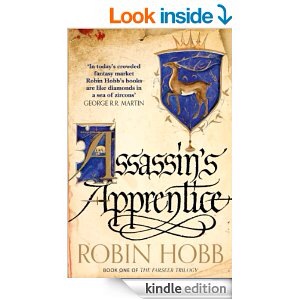This book is old enough and Robin Hobb is successful enough for a review to be essentially meaningless, a bit like reviewing The Lord of the Rings or Terry Pratchett.
However, two factors have led me to review this book;
1. It was free on Kindle.
2. I’m reviewing every book I read.
The story centres on a young boy, the illegitimate offspring of a king in waiting and one who displays powers to communicate telepathically with animals. The boy is referred to as ‘boy’, ‘newboy’, ‘fitz’ or ‘bastard’. I did find the frequent use of the word bastard to be quite jarring, perhaps it’s my delicate English sensibilities! Bastard can still be a grave insult if said with sufficient vitriol but the thing that grated most was the fact that adults were using the word with malice against a child. This felt just cruel and wrong and it must surely have been the intention of Robin Hobb to make the reader empathise with the boy, whose real name is FitzChivalry Farseer, by giving him an upbringing that is so tough and downright medieval.
The world in which Fitz lives is a typical feudal model from the Middle Ages with interesting twists. The king rules by divine right and all others know their place. This is not to say that the rulers are ruthless megalomaniacs. King Shrewd (royals are given names to reflect personal qualities or in the hope that they will act in a manner befitting their name – hence princes Chivalry, Verity and Regal) cares deeply for his kingdom and works tirelessly to protect it using Machiavellian political intrigue and ‘the skill’, a form of telepathic suggestive control.
FitzChivalry is brought up by royal stable master Burrich, one of the strongest and most upright characters in the book. Whilst he is a disciplinarian Burrich is the closest thing that Fitz has to a father.
Although he is a ‘bastard’, Fitz cannot be ignored given his father’s position and is dragged into the dangerous world of political scheming. King Regal decides that he should be taught by his faithful assassin, Chade, who is another compelling character and displays some compassion for young Fitz despite the unsavoury nature of his trade.
Fitz, as son of the heir to the throne is seen as an asset by some but as a threat to be disposed of by others. He is dragged into situations not of his making and his life is often in danger because of who he is. Many of us will not feel wholly in control of our lives on occasion and Robin Hobb demonstrates how much more acute this is for children.
The book follows Fitz as he grows up and develops relationships with those inside and outside the royal court. The King’s Fool is an especially intriguing character who talks in riddles and seems to take an interest in helping Fitz, albeit in oblique ways. The book unfolds at a leisurely pace that is just perfect for giving real insight into the characters. Robin Hobb is obviously a very skilful writer but nobody who has read one of her books needs me to point that out.
Towards the end of the book the tension ratchets up as a royal wedding takes Fitz, and much of the Court, to a neighbouring kingdom where he finds himself in danger and seemingly out of reach of his protectors.
I have to admit that the resolution to the book felt a little rushed, as if Robin Hobb was already mentally writing her next book. Had a few more pages been devoted to the ending it would have been more fitting given the painstaking way in which the tale unfolded. Having said that, this is a very good book which has been, and will continue to be, enjoyed by many, many people.
